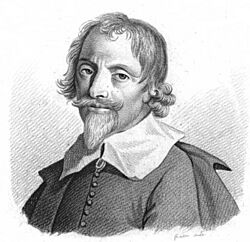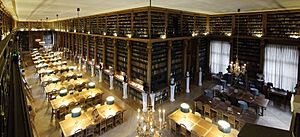Gabriel Naudé facts for kids
Quick facts for kids
Gabriel Naudé
|
|
|---|---|
 |
|
| Born | 2 February 1600 Paris, France |
| Died | 10 July 1653 (aged 53) Abbeville, now Hauts-de-France, France |
| Occupation | librarian, scholar, prolific writer, physician |
Gabriel Naudé (born February 2, 1600 – died July 10, 1653) was a French librarian and scholar. He wrote many books on different topics. These included politics, religion, history, and even the supernatural.
One very important book he wrote was Advice on Establishing a Library in 1627. This book was about how to set up and manage a library. Later, Naudé got to use his ideas in real life. He helped build and manage the Bibliothèque Mazarine. This was the library of Cardinal Jules Mazarin in Paris.
Naudé was an early thinker who influenced later scholars like Pierre Bayle.
Contents
Gabriel Naudé's Life Story
Naudé was born in Paris in early 1600. His family was not rich. His father was a low-ranking official, and his mother could not read or write. His teachers said he was very determined and loved to learn.
He started college at a young age. There, he studied philosophy and grammar. Later, he studied medicine in Paris and Padua. He even became a doctor for King Louis XIII.
Early Writings and Library Work
When he was twenty, Naudé published his first book. It was called Le Marfore ou Discours Contre les Lisbelles. This book caught the attention of Henri de Mesme. Mesme was a high-ranking judge in the Parlement of Paris.
Mesme offered Naudé a job as the librarian for his own book collection. Mesme had a large library for that time, with about 8,000 books. Scholars who had good references could use it. Working in Mesme's library gave Naudé valuable experience. He later used this experience to write his famous book, Advice on Establishing a Library. Naudé wrote Advice for Mesme. It was a guide on how to build and take care of his library.
In 1629, Naudé became a librarian for Cardinal Giovanni Francesco Guidi di Bagno in Rome. After Bagno died in 1641, Naudé became the librarian for Cardinal Francesco Barberini.
Building the Mazarin Library
Cardinal Richelieu wanted Naudé to be his librarian. But Richelieu died. So, Naudé accepted a similar job from Cardinal Mazarin. For the next ten years, Naudé worked hard. He gathered books from all over Europe to create the Bibliothèque Mazarine.
Mazarin had brought over 5,000 books with him to Paris. Like Naudé, he believed that libraries should be open to the public. He thought this would benefit everyone. In 1642, Mazarin bought a building for his library. He told Naudé to build the best collection possible.
Naudé found that the fastest way to get books was to buy entire libraries. He had written this advice in his book. Naudé searched through second-hand bookshops. Mazarin also told his ambassadors, government officials, and generals to collect books for him. Naudé traveled across Europe. During one trip, he collected over 14,000 books.
By 1648, the library had about 40,000 books. It was open regularly and had almost 100 regular visitors. Several staff members kept it running smoothly. It became the first library in France to be open to everyone, without needing special permission.
Later Life and Legacy
Mazarin's library was sold during a time of trouble called the Fronde. Queen Christina then invited Naudé to Stockholm, Sweden. However, Naudé was not happy there. When Mazarin asked him to help rebuild his scattered library, Naudé returned right away.
But his health was poor. He died on his journey back, in Abbeville on July 10, 1653. Naudé was a friend of many smart thinkers of his time. He was not just a person who loved books. His writings showed a critical mind. He helped prepare the way for the famous writers of the time of Louis XIV.
Naudé's Work as a Librarian
Naudé believed that libraries should be open to everyone. He was against censoring books. He thought that library owners should let others use their books. He saw this as a great honor for the owner.
Naudé liked to collect books in their original form. He also believed in keeping collections complete. He thought it was important to consider what readers needed. He also felt that experts in different fields should help choose books. He strongly believed in collecting books in all languages. He wanted books about all religions, subjects, and types of literature.
During his time as a librarian, Naudé advised collectors and libraries. He taught them how to choose and buy books. He also showed them how to create lists of their books. He was a big supporter of looking in second-hand bookshops. He also checked print shops for valuable and rare books. It was said that when Naudé visited a town, bookshops looked empty. He would buy almost every book, whether old or new, on any subject.
Naudé also had interesting ideas about where a library should be. He thought it should be in the center of a community. But it should be far enough from noisy streets. He suggested it should be between a large courtyard and a nice garden. This way, it would get good light and fresh air.
The most famous library Naudé helped build was the Bibliothéque Mazarine in Paris. This was Cardinal Jules Mazarin's library. Naudé spent ten years making it better. Because of Naudé's strong belief, it became the first public library in France. It opened to everyone as early as 1644.
Naudé's main work on library science was Advice on Establishing a Library. This book was like an early guide for private collectors. It taught them how to buy and care for books. Naudé told collectors and librarians to organize their books carefully. He suggested sorting them by number, subject, and how they were chosen. He also gave ideas for arranging the library building itself. Naudé's knowledge had a lasting impact on libraries and the world. His ideas guided collectors, scholars, and leaders.
Important Books by Naudé
Naudé wrote or edited many works. Here are some of his most important ones:
- Le Marfore, ou discours contre les libelles (1620): This was his first book.
- Apologie pour tous les grands personages faussement soupçonnez de magie (1625): In this book, he defended famous people like Pythagoras and Socrates. They were wrongly thought to use magic.
- Advis pour dresser une bibliothèque (1627): This book is about how to set up a library. It has good and open-minded ideas about librarianship. It is seen as a key book in the field of library science.
- Considérations politiques sur les coups d'état (1639): In this book, Naudé followed the ideas of Machiavelli. He believed that politics should be separate from morals and religion.
Advice on Establishing a Library
Naudé wrote Advice as a guide for people building their own libraries. He based it on his own experiences and research. In the introduction, Naudé said he wasn't a perfect expert. But he shared what he thought were the most important ideas. He used his time in Mesme's library to write about the best practices for librarians. The book had chapters on topics like how many books to have, how to choose them, and how to get them.
Why Build a Library?
Naudé's first chapter asks, "Why establish a library?" He answers simply: there is no greater honor than building a great library and sharing it. He believed libraries should learn from the best libraries in the world. The first step is to make a plan. Before building a library, a person must learn about collecting and organizing books. They should also ask for advice from people who have already built libraries. He suggested studying and copying lists of books from other libraries.
Choosing and Getting Books
Naudé spent a whole chapter on choosing books. He said the first books to buy should be from experts in their fields. It didn't matter if the books were old or new. If a book was highly respected by experts, it should be in the collection. Also, any well-known explanations or comments on those books were necessary.
Naudé suggested buying books in their original languages. This is because meaning can often be lost when books are translated. He was strongly against any kind of censorship. Naudé believed that every book has a reader. He thought information should be free and available to everyone. Readers could always find a use for a book, even if it was to disagree with its ideas. Some books are popular for a while and then forgotten. He argued that it would be good for a library to have many copies of these books. This would meet the popular tastes of the time.
In his chapter on getting books, Naudé gave clear tips. The easiest way, he said, was to buy another library completely. Naudé also praised second-hand book sellers. They often offered good books at low prices. Naudé himself looked through book-binding and printing shops for used paper. Once, he found a rare old book that a book binder was using as scrap paper!
Organizing the Books
Naudé also included a chapter in Advice on how to arrange books. He quoted Cicero, who said, "It is order that gives light to memory." He gave instructions that he thought made sense. His main topics for organizing books included theology, philosophy, law, medicine, history, math, and humanities. Naudé added more topics later. But these categories covered most of the knowledge in the world at that time. He said each section should be divided into smaller parts. The most important authors should come first, followed by comments on their works.
See also
 In Spanish: Gabriel Naudé para niños
In Spanish: Gabriel Naudé para niños
- Marie de Gournay
 | DeHart Hubbard |
 | Wilma Rudolph |
 | Jesse Owens |
 | Jackie Joyner-Kersee |
 | Major Taylor |


